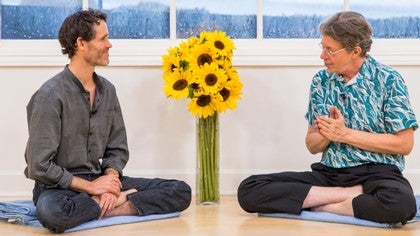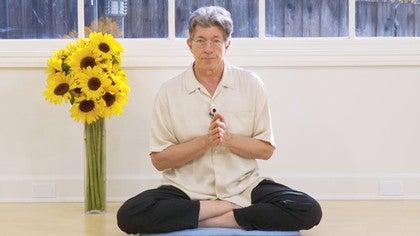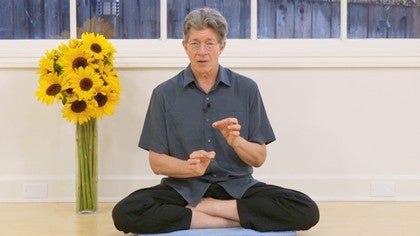Description
About This Video
Transcript
Read Full Transcript
(waves crashing) I'm happy to welcome my Ayurvedic teacher, mentor, and friend, Dr. Robert Svoboda to have a discussion about how we use our actions to enhance our alignment with what we're really interested in doing in life. And so, welcome, Dr. Svoboda. Thank you Dr. Scott. In terms of the Ayurvedic perspective on the way people conduct themselves through the day, is there a term that sort of holds, that circumscribes the actions that somebody does each day that may be beneficial or not? The word we commonly use is dinacharya.
Din means day and acharya, or achar means the way that you move through the day. Chara means to move. So, it's not, it's very much not a static kind of thing, it's a dynamic thing. It's an understanding not only that there are things that you're going to do during the day, but that you will do well to pace yourself properly as you do those things during the day. In that way it's very much a variety of a more general term that we can call niyama.
And niyama, a word that I expect will be familiar to many of your listeners and watchers, from Patanjali's yoga sutras, comes from the root yama which means to be disciplined, to restrain yourself in a particular way. And niyama, in a positive way. One that will permit things to flow. That's where the ni part comes in. So niyama, it's restraint, it's discipline, but it encourages overall the flow to flow really well.
And that's what dinacharya is all about. One day in the life of a human being, in a way, recapitulates the entire life. You're in an inert form as if you didn't even exist. You wake up, it's a new day, it's like a new life. You move through your day, you start slowly, you accelerate, and then you decelerate, ideally, and then you come to the end of the day and you have lived what we hope is a very full and rewarding and satisfying day.
And in terms of that arc of activity, what are some concepts or practices that are considered to be very important for the beginning of the day? Well in my opinion, the first thing is pace. That you should have the awareness that as even with something as simple and happily as commonly employed nowadays as exercise, you don't immediately go out, if you're a sensible person and try to do whatever it is that, suppose you are going to play tennis. You don't immediately go out and start whacking the ball around. You need to warm yourself up so you don't end up pulling a muscle or doing something worse.
It's the same with the day. You need to compose yourself, make sure that your life force, the prana is circulating well. If it's not circulating well do something to encourage it to circulate well. Clean all of the orifices that the prana goes into and comes out of. Prepare yourself, identify how your body feels.
Understand what you're going to do during the day and compose yourself to move in the direction and do it. If you're going to run a marathon, you're going to run at a very different pace than if you're running a sprint. So it's the same thing with your day. If you know that you're going to have a very busy day, you have to know that you're going, you have to be very alert, but you cannot afford to go out there like a headless chicken and run around and try to do everything and keep drinking coffee hoping that somehow it's going to make you more concentrated. That's one thing that caffeine will never do.
It will not make you more concentrated. If you're already concentrated, it may facilitate the continuation of that concentration. If you're already completely frazzled, your frazzilization is only going to get magnified. So that's an important, one important thing about dinacharya to understand because many people get up, drink their double espresso, rush out the door while they're texting with one hand and buttoning their shirt with the other hand and try to go from zero to 60 in about ten seconds. That's a wonderful prescription for ruining yourself sometimes slowly and sometimes if you are not paying attention while you're driving down the road very quickly.
Yes. Yeah, so it sounds like you're saying too is that there is, people wake up and there's momentum into the day and if you're conscious of creating a good pace for that momentum, it helps to channel your energy in a way where it can be more focused and ideally, more potent because of that focus. But that's what living consciously is all about. If you're more, if you apply your consciousness which is what, which is available to us at all times, if you apply your consciousness to the overall reality of what your day is and you understand what it is you need to do, and you're not afraid of what you may have to do and you're not overanticipating what you may do, then you stand in much better chance of actually getting those things done in an agreeable way, and of having a satisfying experience of the day. And so when inevitably somebody meets a challenge, those challenges often are the things that undo the best laid plans.
And so, in terms of what you're talking about, how would you elaborate on the way that dinacharya is and niyama, as a form of niyama, is a way to stay aligned through the vicissitudes you know, the inevitable challenges and the winds of change that confront you in any given day. If you get up in the morning and you do some meditation and you do some yoga or some other kind of prana aligning and circulating exercise and you do some actual exercise to make your, to get your circulation to move around well and if you eat a small amount of what's appropriate, then you've already, you've already informed your system that there is a possibility for living in a healthy way. You've already given it some sense that it can live in a healthy way. You've already given it some sense that even though these were small challenges that you presented to it, they were still challenges and that it has been able, you've, the system by virtue of achieving what it is that you called upon it to do, it has met those challenges, it has surmounted them, and simply by doing that that provides it a sense that whatever challenge that comes to it during the day is something that it will be able to surmount, or if it can't surmount it, it will be able to engage with that challenge in some positive way and not simply be completely stymied by it or flustered by it, flummoxed by it, bamboozled by it, or disturbed by it in some other way. Right.
And in the same way that we've been talking about the morning, the afternoon has a very different energy than the morning and the pace and the behavior that you adopt in the afternoon will have to adapt to your changing energy levels, what's possible in that timeframe. So what are some ideas from dinacharya, for keeping your prana well aligned through the afternoon? Well, the energy of the morning is very much energy as the sun rises and the sun gradually gets stronger. Warmth often occurs, but definitely light increases. So the energy of the morning is very much an energy of opening up, becoming more active, becoming, enhancing the scope and the span of your activities.
The middle of the day is the time when you're most engaged with the day. As the sun starts to move towards setting and as the light starts to wane and as the heat starts to reduce, there is a general tendency in your organism to move in the direction of an increase in what we call vata, which for this purpose we can simply identify with nervous energy. It's much less likely in the afternoon that you're going to be able to do things that require you to make serious evaluations and serious decisions. It's much better to be doing routine things in the afternoon. You've already used a lot of your energy.
It's much better not to be putting yourself in a position where you have to work very hard and if you can avoid it, that you have to work very hard in the afternoon. It's much better to be taking ample time, take a few minutes here just to and there just to breathe, just to allow yourself to come back and recenter. Recentering is the most important thing to happen in the afternoon. If you keep on a regular basis recentering yourself, just taking an extra breath or two very calmly, very slowly, very regularly, it's much easier for you to get through that period in a way that is very consistent and very effective. What is not effective again, is to expect that in the afternoon you're not quite as focused.
Your awareness is a little bit more diffuse, perhaps, than it was, what's not so effective is to then take more stimulants and put yourself under pressure because that's not going to make you more focused, it's definitely going to create more dissonance in your organism and make you less effective. Right, and I've seen that clinically through and through for two decades that people, in the afternoon if the morning is a naturally exuberant time so they get going and then if they try to have a multitasking lunch and then push hard through the afternoon with stimulants, they're often much less productive, creative, sensible, all these things that really actually help them to succeed at what they're interested in, and so I often advocate people using the midday meal as a form of restorative yoga where they actually clear the field to simply focus on eating and relaxing so there's this natural kind of sine wave of you know, going into a relatively calm, relaxed, inactive state and then there's another one which is the kind of natural siesta time where people will, the adrenal glands come to their ebb of the day, and so giving them advice about saying yield to these signals. Do something where again you slow yourself down even if you go as far as to put your legs up the wall and do some conscious breathing while you rest on your back for ten or 15 minutes, can make a very big difference in people's mood, emotional balance, and their energy levels. Is there anything that you've noticed that you feel like are particularly good practices for the afternoon? Well I would say just as you were saying, something like a siesta.
Now actually taking a siesta and lying down and going to sleep I find to be most effective. In the tropics, and not just in the tropics, but in the tropics when it is really hot, when it's really hot in the afternoon that's a very good time to lie down and sleep for 20 or 30 minutes. Not for two hours. That's too long to sleep during the day, but definitely when it is very hot, half an hour nap is something that will preserve your organism from being made distraught by the intensity of the heat, the light, and the general intensity of the day. I think a big major problem as you were just eluding to in our society and our culture is that people they take that exuberance of the morning, they expand with it, and they believe they can continue to expand all day long until they somehow collapse.
And but they're actually secretly hoping they will not collapse and they can just work for 24 hours a day and continue expanding indefinitely. Things do not expand indefinitely. We've seen this more than once. There is boom followed by bust. Things go up and then they go down.
This happens in everything. It happens in the stock market. It happens in the human, it happens in the year. There is the spring, then there's the summer, then there's the fall, then there's the winter. It's completely natural and it should be acknowledged.
So, I think it's extremely important, just as you said, to make sure that you have some time that during the afternoon where you can, it creates an, by creating an interruption in your day yes, it permits you to change gears more easily. I think that in most climates and for most people it's important to have some nice, warm beverage at least a cup, and not a caffeinated beverage but something nice and warm that is calming and rehydrating during the afternoon because it provides the, a little bit of, it takes a little bit of the edge off of that nervous energy that makes it a little more, a little easier. If nothing else it's good to just go out and take a ten or a 15 minute walk. Just something to do. Whatever that, the energy in the afternoon is not something that automatically comes to center.
So you have to do something to get rid of whatever nervous energy has to be burned off, and then to take what's left and to re-pattern it. To pattern it in an appropriate way. And this could be done by anything. If you play the flute, you could take a few minutes off to go in the direction of Bach. If you play, if you sing, then you could take a few minutes off and just sing.
But something, suppose you are an artist. You doodle for a while. Something that takes you away from the focused, purpose driven activity that is driving your day, that allows you to express in a positive way the creative energy that you are, have been harnessing and are continuing to try to harness. But so that you're not consistently trying to keep it in the same channel so that that same channel does not become a rut. We don't want things to become ruts.
We like the energy to be channelized, but not when it becomes so channelized that there's no other place for it to go. Right. Thank you. The end of the day is such a critical transition too, so I'd like to ask you to elaborate into the evening and I'll give you one example from my clinical experience that's come up in the last few years. It's been very useful, especially for people with anxiety depressive kind of tendencies in their mood is to encourage people to do two yoga practices in the day.
One that is maybe more extensive at the beginning of the day to promote more of a physiological kind of effect, and then one that's more subtle in orientation, more meditative, more breath-centered, more restorative at the end of the day that may only be 10 or 15 minutes long as a very distinct transition between the work day and the evening and for people with different kind of mood imbalances, it can be really really helpful to balance those things out. Do you have other suggestions for the evening? Well. We have two natural transitions during the day. The first is dawn, the second is dusk.
This happens to everyone all around the globe. And the dawn transition is the time when we are moving in the direction of expanding out and the evening transition is the time when we're moving in the direction of returning back. So. I think it's quite desirable to do what you've just described. A stronger practice in the morning and a less strong practice in the afternoon.
I think it's also wise to acknowledge unfortunately the way things are organized is that many people either don't believe in eating breakfast or don't have time to eat breakfast and then maybe they don't have, maybe they have 20 minutes for lunch and then very often they have their biggest meal in the evening. If there's any way to avoid this they should be doing that because the time that you're best going to be able to consume things is at noon. This is why I very much have enjoyed the many times that I've gone to Italy to work because lunch is an important thing. People work hard during the morning, they work hard in the afternoon, but lunch is a sacred, as in France, it's a sacred event. And you want to take time to enjoy your food, to enjoy the people that you're eating with before you go back and start working again.
So, ideally this is what you will do. I understand that the way things are organized now this may not be possible, but you do have to be very careful to remember that your organism, if you've been working during the day, it has used up a good amount of its vital energy, of its prana, and you're going to want the prana to return to you, and it's very easy to identify prana with food because we get a lot of our prana with food. And it will be very easy to eat a lot of food at a time when your digestive tract is not interested in having a lot of food. So it's very important that, at the very least you eat very slowly at night because the more slowly you eat the easier it will be for you to identify when you're really full, and it's so much better that if you can find some way to eat your major meal in the middle of the day. I understand that in the evening also it's the time when the family gets together and then food is a way that we use for communion and communication.
So at the very least don't be eating the heaviest kind of food that are the hardest sorts of things to digest in the evening. Eat things that are lighter. Have soup. And have it everything all together with everyone, but have light food, not a whole lot of it, and make sure that you are, that you are employing activities at that time that are activities that are going to facilitate the gentle movement, the gentle circulation so a gentle yoga practice. A walking, going out and walking the dog.
Again, enjoying something and not getting stuck of course on your electronic devices which you probably have been employing all day long but now you want to find out who's doing what to whom on Facebook et cetera. No, no. Don't do that. Just say no. Just say no.
Especially within the first definitely half hour, preferably hour and if at all possible two hours before going to bed. Do not eat before bed, do not exercise intensely before bed, and absolutely do not interact with electronic screens immediately before bed. Because the whole point of going to bed is that you want to rest, and if you are restimulating your nervous system immediately before you go to bed, number one, it's going to be harder to go to sleep and really sleep soundly and number two, you're going to be training yourself not to go to sleep and not to sleep soundly. Right. And this, and so that's kind of the final juncture because as you described the movement is to kind of contract, internalize, prepare to go to sleep.
Do you have any specific practices that you feel like are especially good for harnessing the senses so that it will be easy for the person to transition into sleep and you've already mentioned a number of things to avoid. Are there any things that you really feel like are particularly good? Well. I think it's useful again to return to since many people are aware of Patanjali and his approach to yoga, the fifth of Patanjali's eight limbs of yoga is pratyahara. And pratyahara means to make your senses start to turn away from the outside world and point inward and really that's what sleep is all about.
You're taking the senses which are extending out all day long in all directions, and you're requesting them to come back and point inward. They may be busy. They may cause you to have all kinds of unusual dreams, but the fact is that now they're pointed inward and they're not pointed outward anymore. So anything that you can do to encourage those like not paying attention, not watching TV or, or, or looking at your various screens before going to bed. Not being too physically active.
Not trying to eat new things. Not trying to test new fragrances. Not trying to actively scrub yourself with a dry brush immediately before bed. Nothing that is going to actively encourage your sense organs to be reconnected to the world is going to assist you to go to sleep. So you want to, first of all, not encourage the sense organs to go outward and second encourage them to go inward.
Which may be something as simple as to close your eyes and to close your ears and just allow your awareness to sink back into your organism. Allow it to sink downwards. Allow all of the attention that has been projected out into the world to come back from the world and just kind of encourage it to go back into Pandora's Box from whence it came and go to sleep there until the time tomorrow when it all has to come back and manifest your reality again. Yes. Beautiful, thank you.
And the, you know one thing I think of too with you're kind of at the end of the day no matter what's going on in your relational life, you know whatever relationship you know, harmony or disharmony might be existing in your world there's a sort of fond farewell that happens at sleep and so sometimes I advocate to patients to do different practices, especially for people that they might be in conflict with where they're doing loving kindness or tang lin or some kind of practice where they're actually extending some kind of positive intention and energy in that person's direction, but also very clearly kind of dissolving whatever energy might be lingering in their mind and their hearts before they fall asleep so that it doesn't then just continue in the unconscious state and really cloud the dreams and what not. Is there something in ayurveda that-- That, in fact, is exactly what ayurveda suggests. It suggests that at the end of the day you review what's happened during the day. You ask yourself how well you have lived that day. You acknowledge without beating yourself over the head or any other body part, areas in which you have not lived as well as you could.
Commit yourself to living in a different way thereafter, and also as you point out very correctly in whichever way you have not interacted well with the other members of your family, that's an excellent moment to let everything move from being confrontational to being mediational and to find some way that everything at least should be calm, sufficiently calm, that all parties can go to sleep in a nice, restful kind of way. Yeah, great. So a question that I'm sure is on many people's minds is what's the best time to make love from an ayurvedic perspective in any given day? That's a good question, Dr. Scott. Thank you for asking.
I believe you're familiar with the planet Venus. Yes. Venus sometimes is known as the evening star. Sometimes known as the morning star. It is generally accepted, from the perspective of modern science that men, testosterone is at its highest at four-ish a.m.
five-ish a.m. whereas women are often most receptive in the evening. This of course is a challenge. As are many things in all relationships. So I would say the best time to make love is when both parties (laughing) are able to, that they find a way that is most agreeable for them. But certainly, the best time would be at the sort of time when Venus would be in the sky.
That would be like the early part of the evening or the pre-dawn hours, from the ayurvedic point of view. So it's the, the the immediately after dusk hours are when the body is still there's a certain amount of cuppa in so there's a certain amount of juiciness in the body and therefore the, however vigorous the love making might be, it's not likely to aggravate the body too much. And in the morning hours, there is a large amount of vata. That means there is a good amount of energy in the system and therefore that energy can, potentially profitably be turned to intimate embraces. Generally speaking, it is better to be asleep in the middle of the night.
Great, thank you.
Prana: Robert Svoboda & Scott Blossom
Comments
Lovely to have you both here!!!
You need to be a subscriber to post a comment.
Please Log In or Create an Account to start your free trial.















